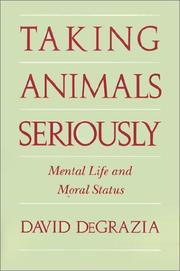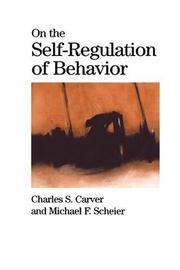| Listing 1 - 6 of 6 |
Sort by
|
Multi

ISBN: 9780674062917 9780674058040 Year: 2012 Publisher: Cambridge, Mass. Harvard University Press
Abstract | Keywords | Export | Availability | Bookmark
 Loading...
Loading...Choose an application
- Reference Manager
- EndNote
- RefWorks (Direct export to RefWorks)
Psychology --- Primates --- Social psychology. --- Neuropsychology. --- Psychology, Comparative. --- Comparative neurobiology. --- Psychology.
Multi
ISBN: 9783031608032 9783031608025 9783031608049 9783031608056 Year: 2024 Publisher: Cham Springer Nature, Imprint: Springer
Abstract | Keywords | Export | Availability | Bookmark
 Loading...
Loading...Choose an application
- Reference Manager
- EndNote
- RefWorks (Direct export to RefWorks)
In this book, the major and at the same time most difficult questions of comparative cognition research - here called the sextet of animal intelligence - are presented using good examples, discussed in all their facets and finally answered with due caution. Starting with the question of human rationality, which is illuminated historically at the beginning and presented as a framework concept, the latest research is dealt with, which either revises preferred interpretation schemes or calls for new ones. It is particularly important to critically question hastily conceived categorisations, often derived from research on the human species and from everyday psychological notions, and to consider so-called animal irrationality, a.k.a. (mis)performance, from the perspective of species-specific, natural requirements. Why is it at all important to know whether animals can act rationally, intentionally or consciously? The answer is because it is of both theoretical and practical relevance. Theoretical relevance is twofold: because it is good in itself to understand animals better, but this knowledge is then also of great importance for assessing ourselves. This brings up the practical relevance: we are not only surrounded by animals, we live with animals, we live from animals. Yet we see ourselves as separate from them in important ways. Consciousness, language and rationality are essential characteristics with which we justify our human uniqueness and thus our superiority and ultimately our right to dominate and use animals in many ways. If an animal can feel pain, we feel obliged to avoid inflicting unnecessary pain on it. But yet we do not accord it the special inherent value and dignity associated with consciousness and rationality. This has far-reaching consequences for human action and the coexistence of humans and animals.
Psychology --- Social psychology --- gedrag (mensen) --- psychologie --- Psychology. --- Psychology, Comparative. --- Cognition in animals. --- Behavioral Sciences and Psychology. --- Comparative Psychology. --- Animal Cognition. --- Psicologia comparada --- Cognició en els animals

ISBN: 0521567602 052156140X 1139172964 9781139172967 9780521561402 9780521567602 Year: 2001 Publisher: Cambridge Cambridge University Press
Abstract | Keywords | Export | Availability | Bookmark
 Loading...
Loading...Choose an application
- Reference Manager
- EndNote
- RefWorks (Direct export to RefWorks)
This book distinguishes itself from much of the polemical literature on these issues by offering the most judicious and well-balanced account yet available of animals' moral standing, and related questions concerning their minds and welfare. Transcending jejune debates focused on utilitarianism versus rights, the book offers a fresh methodological approach with specific and constructive conclusions about our treatment of animals. David DeGrazia provides the most thorough discussion yet of whether equal consideration should be extended to animals' interests, and examines the issues of animal minds and animal well-being with an unparalleled combination of philosophical rigor and empirical documentation. His book is an important contribution to the field of animal ethics and will be read with special interest by all philosophers teaching such courses, as well as biologists, those professionally involved with animals, and general readers concerned about animal welfare.
Professional ethics. Deontology --- Animal ethology and ecology. Sociobiology --- Animal psychology. --- Animal welfare --- Moral and ethical aspects. --- Animal psychology --- Animaux --- Psychologie animale --- Moral and ethical aspects --- Protection --- Aspect moral --- Animals --- Psychology --- Psychology, Comparative --- Arts and Humanities --- Philosophy
Multi
ISBN: 9783031297892 9783031297885 9783031297908 9783031297915 Year: 2023 Publisher: Cham : Springer International Publishing : Imprint: Springer,
Abstract | Keywords | Export | Availability | Bookmark
 Loading...
Loading...Choose an application
- Reference Manager
- EndNote
- RefWorks (Direct export to RefWorks)
Dogs are a valued part of millions of households worldwide. They also serve many functions in human societies from herding livestock to detecting drugs, explosives, or illegal wildlife to providing physical assistance or emotional support to those in need. Yet, in terms of behavior and cognition, dogs have only become a serious subject of scientific study in the last 20 years. Similarly, we have recently witnessed a sharp increase in studies of canine-human interaction, exploring the motivational, emotional, cognitive, physiological, and neural mechanisms of dogs on human psychology and well-being. This book is a collection of chapters stemming from the Nebraska Symposium on Motivation, which focused on Canine Cognition and the Human Bond. The primary goal of this symposium was to bring together researchers from psychology, biology, neuroscience, and anthropology to delve deeper into the canine-human bond. These chapters describe the current state of knowledge from international experts in the fields of canine cognition and canine-human interaction. Bridging these two areas can help us better understand the canine-human bond, potentially improving the lives of both dogs and people. International experts on dog behavior/cognition and dog-human interactions Brings together researchers focusing on the dog perspective and the human perspective Interdisciplinary with experts in anthropology, biology, neuroscience, and psychology.
Psychology --- Social psychology --- gedrag (mensen) --- psychologie --- Psychology. --- Cognition in animals. --- Psychology, Comparative. --- Interpersonal communication. --- Social perception. --- Behavioral Sciences and Psychology. --- Animal Cognition. --- Cross-species Comparison. --- Communication Psychology. --- Social Cognition. --- Animals --- Nature --- Gossos --- Relacions home-animal --- Psicologia --- Psicologia.
Multi
ISBN: 9781856048224 1856048225 1856049523 1299278183 9781856049528 Year: 2013 Publisher: London : Facet Pub.,
Abstract | Keywords | Export | Availability | Bookmark
 Loading...
Loading...Choose an application
- Reference Manager
- EndNote
- RefWorks (Direct export to RefWorks)
A vision for the future of information literacy teaching Based on groundbreaking research, undertaken by the authors as part of the prestigious Arcadia Programme at Cambridge University, this presents a new and dynamic information literacy curriculum developed for the 21st century information professional. The curriculum adopts a broad definition of information literacy that encompasses social as well as academic environments and situates IL as a fundamental attribute of the discerning scholar and the informed citizen. It seeks to address in a modular, flexible and holistic way the developing information needs of students entering higher education over the next five years. Interweaving the authors' research and the reflections of internationally-recognised experts from the library, education and information literacy sectors, it will illustrate how and why this new curriculum will work in practice.
Information systems --- Information user --- Information literacy --- Study and teaching (Higher) --- Information behavior. --- Human behavior. --- Action, Human --- Behavior, Human --- Ethology --- Human action --- Human beings --- Human biology --- Physical anthropology --- Psychology --- Social sciences --- Psychology, Comparative --- Information-seeking behavior --- Human behavior --- Behavior --- Libraries and colleges. --- Culture de l'information --- Bibliothèques et universités --- Social aspects --- Etude et enseignement (Supérieur) --- Aspect social --- Social aspects. --- Colleges and libraries --- Libraries and universities --- Universities and libraries --- Universities and colleges --- Academic libraries --- Literacy, Information --- Information science --- Information literacy - Study and teaching (Higher)

ISBN: 0521572045 0521000998 1316098850 1316046095 1139174797 9780521572040 9781139174794 9780521000994 Year: 1998 Publisher: Cambridge: Cambridge university press,
Abstract | Keywords | Export | Availability | Bookmark
 Loading...
Loading...Choose an application
- Reference Manager
- EndNote
- RefWorks (Direct export to RefWorks)
This book presents a thorough overview of a model of human functioning based on the idea that behavior is goal-directed and regulated by feedback control processes. It describes feedback processes and their application to behavior, considers goals and the idea that goals are organized hierarchically, examines affect as deriving from a different kind of feedback process, and analyzes how success expectancies influence whether people keep trying to attain goals or disengage. Later sections consider a series of emerging themes, including dynamic systems as a model for shifting among goals, catastrophe theory as a model for persistence, and the question of whether behavior is controlled or instead 'emerges'. Three chapters consider the implications of these various ideas for understanding maladaptive behavior, and the closing chapter asks whether goals are a necessity of life. Throughout, theory is presented in the context of diverse issues that link the theory to other literatures.
Social psychology --- But (Psychologie) --- Control (Psychology) --- Controle (Psychologie) --- Contrôle (Psychologie) --- Doel (Psychologie) --- Feedback (Psychology) --- Goal (Psychology) --- Inner Strength --- Innerlijke kracht --- Kracht [innerlijke ] --- Power (Psychology) --- Reactie (Psychologie) --- Réaction (Psychologie) --- #PBIB:2001.1 --- Goal setting --- Setting of goals --- Motivation (Psychology) --- Learning, Psychology of --- Reinforcement (Psychology) --- Emotions --- Psychology --- Senses and sensation --- Klinische psychologie --- specifieke problemen --- Control (Psychology). --- Feedback (Psychology). --- Goal (Psychology). --- specifieke problemen. --- Health Sciences --- Psychiatry & Psychology --- Human behavior. --- Action, Human --- Behavior, Human --- Ethology --- Human action --- Human beings --- Human biology --- Physical anthropology --- Social sciences --- Psychology, Comparative --- Behavior --- Gedrag. --- Zelfregulatie.
| Listing 1 - 6 of 6 |
Sort by
|

 Search
Search Feedback
Feedback About UniCat
About UniCat  Help
Help News
News